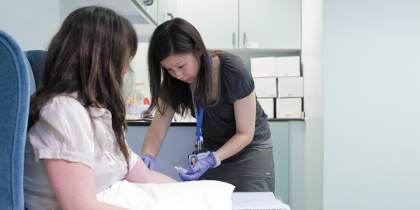
September 12, 2006, by Teaching at Nottingham
Interprofessional teaching of communication skills
Simon Conroy, Lyneth Evans, Sujay Galen, Amy McPherson and Nick Raine-Fenning:
Background
“Communication skills are essential for all healthcare professionals when interacting with patients. Improving their communication skills can also lead to improved health outcomes for patients. Video feedback gives the student an opportunity for reflection, and is advocated by professional bodies in healthcare.
“There is growing interest in developing inter-professional teaching in healthcare. Inter-professional teaching should promote better understanding of different healthcare professionals’ roles, which can in turn promote integrated care for patients. Other potential benefits of inter-professional teaching include sharing resources and staff, collaboration and avoiding duplication. In the current environment within the university with expanding student numbers, the inter-professional teaching of communication skills will bring with it all the potential benefits that’s been discussed. However the feasibility of providing an inter-professional, patient centred communication skills teaching has not been investigated to date.
Aim
- To explore the experience and views of healthcare students participating in interdisciplinary communication skills teaching involving real patients and video feedback.
- To identify barriers in conducting interdisciplinary teaching of communication skills.
Methods
“Seven students from three different healthcare disciplines were videotaped whilst individually conducting an interview with a real patient. Brief patient feedback was also recorded. The same students subsequently reviewed and critiqued the videotaped sessions as a group, facilitated by experts (lecturers) from three disciplines. The experts also provided feedback where appropriate, using the Calgary-Cambridge Observation Guide (CCOG) as a framework. Thematic analysis of the student’s feedback session was performed.
Results
“Students overwhelmingly felt that both watching themselves on video and receiving feedback from students outside their discipline was helpful. For example, students suggested that inter-disciplinary training reduced competitiveness often found in single-discipline group work. However, conducting this pilot study was challenging and resource-intensive.
Discussion
“Interdisciplinary teaching of communication skills is feasible and healthcare students evaluated it positively. The strengths of this study include the qualitative approach which is particularly suited for assessing process information. The combination of a patient focussed approach, within an interdisciplinary setting and using video feedback is a novel technique, not previously reported. Further work is justified to determine if interdisciplinary teaching is resource-effective and superior to single-disciplinary teaching.”
Paper presented at the University’s Ninth Learning & Teaching conference (September, 2006).
| Dr Simon Conroy School of Community Health Sciences |
Lyneth Evans School of Pharmacy |
| Dr Sujay Galen School of Community Health Sciences |
Dr Amy McPherson School of Nursing, Midwifery & Physiotherapy |
| Prof Nick Raine-Fenning Clinical Associate Professor & reader in Reproductive Medicine and Surgery School of Human Development |
This article was originally published as part of PESL’s Teaching at Nottingham collection.
No comments yet, fill out a comment to be the first

Leave a Reply